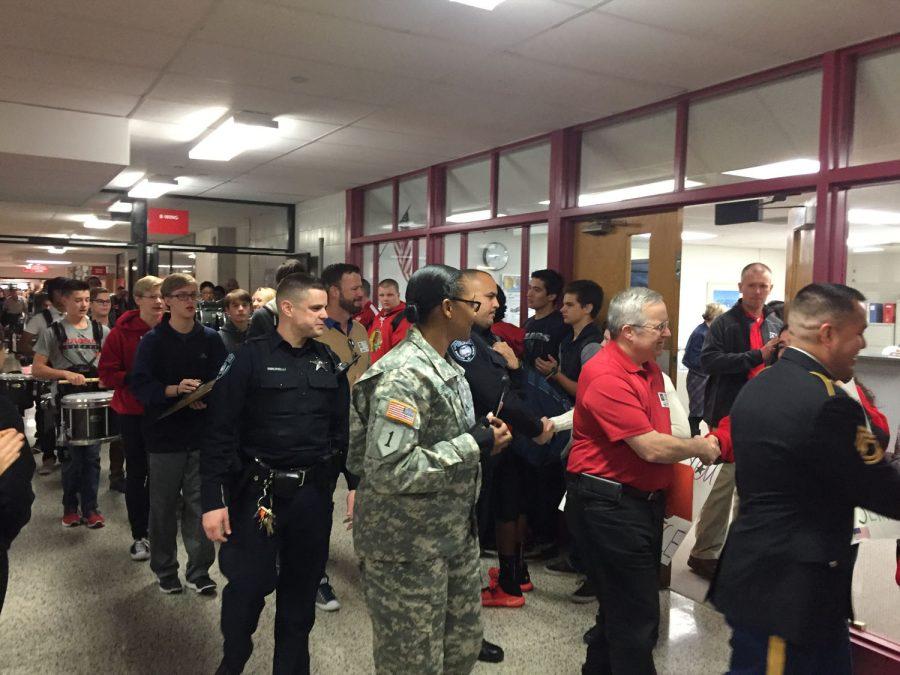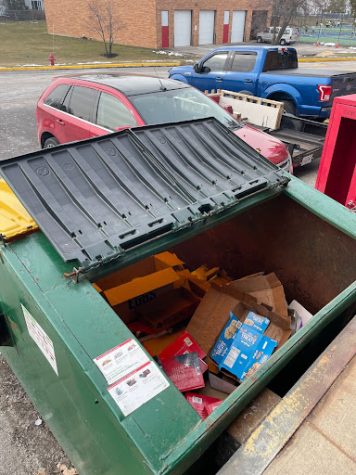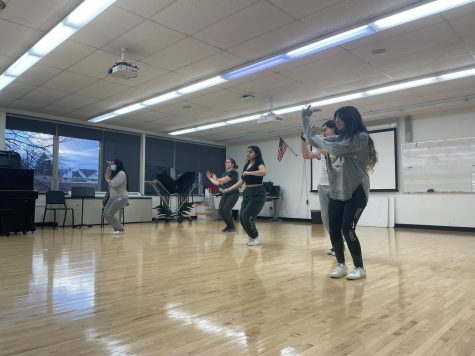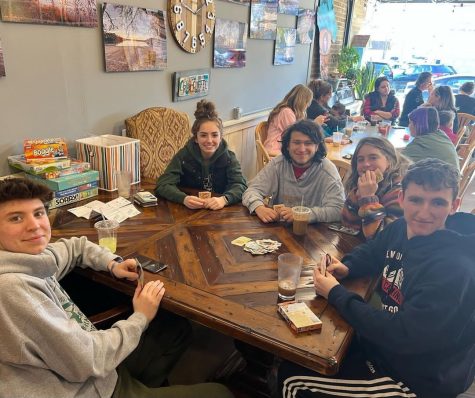Veteran’s Day: A Time For Students Lessons, Reflections
Staff and students greet Veterans as they enter the building on Veterans day. The MHS Marching Band led a parade of Veterans around the school in honor of their service and sacrifice.
January 6, 2017
One had wrinkles across all surfaces of his face but was deceivingly youthful. The other had many years ahead, but his eyes told of a time of difficult seasons.
Both shared their stories with the class, told a couple of jokes, but neither of them may have known the full impact of their presence in class that day.
There is an elective class called America at War. While it sounds like a class that glorifies war, it challenges the students’ own opinions about war and American involvement in other countries. As students travel the history of the United States via the eyes of war, they learn the horror stories of each war along with the quirky facts.
One aspect all students who take the class appreciate is the notion of why it is important to respect veterans, no matter what their job or rank was or is, no matter what a person’s opinions are on the war.
On Veterans Day, the America at War elective along with other social sciences classes taking place during first hour was blessed with a visit from veterans, representing various conflicts and wars. A Korean War and Afghanistan veteran were the two who came into the America at War class.
Both veterans were in the navy. The Korean War veteran explained how he was on a ship during the war and all of the jobs he had to take on.
The Afghanistan veteran was a Naval Corpsman (medic) but worked with the Marines because the Marines do not have their own medics.
Both explained what basic training was like. Sometimes their stories would overlap because the training hasn’t changed much over the years; other times their stories did not. But overall one fact remained true: in basic training, boys become men, even if they don’t want to.
Both veterans signed up to be in the military. The Korean vet said he was going to be drafted anyway; at least he could pick which branch he was going to fight with. The Afghanistan veteran said he wasn’t sure what he wanted for his future, so he enlisted in the navy.
As both went on about their experiences, the students all relished in their stories and found value in what each veteran had to say.
A handful of students within the class each have their own relatives who were veterans involved in many conflicts; therefore, these students know the importance of our veterans.
However, it’s different when one listens to the stories of non-family members. As we get caught up in the busyness of life, we often forget there are others out there besides the ones in our own little bubble, and those outside of our bubble have offered so much for our country.
As my class and I sat there and listened to what each of them had to say, we were reminded of the men and women out there who, without their actions, big or small, the America we know today may not be what we see today.
It also brought to life lines from the poem “A Veteran Died Today” by an unknown writer:
“It’s so easy to forget them, for it so long ago, that our
Bobs and Jims and Johnny’s went to battle, but we know.
It was not some other guy with a compromise and ploy,
who won for us the freedom that our country enjoys”
It is true that our country is not perfect, and many of our systems are broken, but we gain a new appreciation when we take a step back outside of our own selfish perspectives and compare America to other countries where women may not have the right to an education or to vote, where there may not be systems set in place to get some sort of substantial food to residents, where every citizen isn’t always granted basic human liberties. We have our veterans to thank for all these blessings others don’t have because they fought for all of those rights.
As you sit in your history classes and learn about the wars and conflicts the U.S. has been involved in, all these statistics get thrown at you and none of them really mean anything to you, but once you single out a person within the war or conflict, you gain an enriched story of history.
Within the short 30 minutes the two veterans spent with us, the students in the classroom learned the true meaning of one is a story, one million is a statistic.


![MHS Alum Trey Baker hosting a MBK rising event on February ninth at the MHS annex. Said Baker, “I’m just really excited [and] super grateful for the community of Mundelein, for our educators, for our administration, at MHS who are really buying into this.”](https://mhsmustang.com/wp-content/uploads/2023/03/TreyBaker-350x475.jpg)

